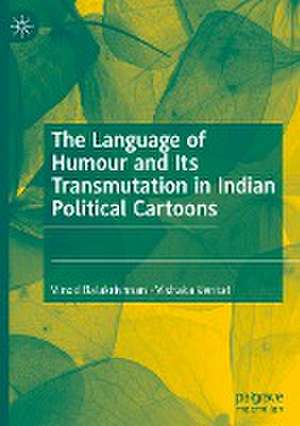The Language of Humour and Its Transmutation in Indian Political Cartoons
Autor Vinod Balakrishnan, Vishaka Venkaten Limba Engleză Hardback – 14 iul 2023
Preț: 697.15 lei
Preț vechi: 820.18 lei
-15% Nou
Puncte Express: 1046
Preț estimativ în valută:
133.40€ • 145.36$ • 112.41£
133.40€ • 145.36$ • 112.41£
Carte tipărită la comandă
Livrare economică 23 aprilie-07 mai
Preluare comenzi: 021 569.72.76
Specificații
ISBN-13: 9783031328350
ISBN-10: 3031328353
Pagini: 211
Ilustrații: XIX, 211 p. 15 illus.
Dimensiuni: 148 x 210 mm
Greutate: 0.43 kg
Ediția:2023
Editura: Springer International Publishing
Colecția Palgrave Macmillan
Locul publicării:Cham, Switzerland
ISBN-10: 3031328353
Pagini: 211
Ilustrații: XIX, 211 p. 15 illus.
Dimensiuni: 148 x 210 mm
Greutate: 0.43 kg
Ediția:2023
Editura: Springer International Publishing
Colecția Palgrave Macmillan
Locul publicării:Cham, Switzerland
Cuprins
Chapter 1: Introduction - Understanding Humour.- Chapter 2: Performance of Humour in Political Cartoons.- Chapter 3: A Communicative Framework of Humour.- Chapter 4: Metaphor - The Rhetorical Frame of Humour.- Chapter 5: Application of the Model.- Chapter 6: Language, Context and Operation of Humour.
Notă biografică
Vinod Balakrishnan is a Professor in English in the Department of Humanities and Social Sciences at the National Institute of Technology, Tiruchirappalli, India. He is a practising poet, motivational speaker, reviewer of books and a yoga enthusiast. His research interests include somaesthetics, politics of representation, film studies, life writing and narratives about India. Currently, he is working on “The Role of the Public Intellectual and the Future of the Humanities”.
Vishaka Venkat is an Assistant Professor in English in the School of Linguistics and Literary Studies at Chinmaya Vishwa Vidyapeeth, India. Her primary research interests include humour, Indian aesthetics, children’s literature, popular culture and mythology.
Vishaka Venkat is an Assistant Professor in English in the School of Linguistics and Literary Studies at Chinmaya Vishwa Vidyapeeth, India. Her primary research interests include humour, Indian aesthetics, children’s literature, popular culture and mythology.
Textul de pe ultima copertă
This book develops a model to examine the language of humour, which is multimodal and accounts for the possibility of transmutation of humour as it is performed through editorial cartoons. By transmutation is meant the transition in the language of humour when it crosses its own boundaries to provoke unprecedented reactions resulting in offensiveness, disappointment or hurt sentiment. The transmutability about the language of humour points to its inherently diabolical nature which manifests in the performance of controversial cartoons. The model is built by borrowing theoretical cues from Roman Jakobson, Roland Barthes, George Lakoff and Mark Johnson. The integrated model, then, is developed to examine the cartoons which were recommended for deletion by the Thorat Committee, following a cartoon controversy in India. Through the cartoon analysis, the model discerns the significance of context and temporality in determining the impact of humour. It also examines how the ethics of humour;the blurred lines of political correctness and incorrectness are dictated by the political atmosphere and the power dynamics.
Vinod Balakrishnan is a Professor in English in the Department of Humanities and Social Sciences at the National Institute of Technology, Tiruchirappalli, India. He is a practising poet, motivational speaker, reviewer of books and a yoga enthusiast. His research interests include somaesthetics, politics of representation, film studies, life writing and narratives about India. Currently, he is working on “The Role of the Public Intellectual and the Future of the Humanities”.
Vishaka Venkat is an Assistant Professor in English in the School of Linguistics and Literary Studies at Chinmaya Vishwa Vidyapeeth, India. Her primary research interests include humour, Indian aesthetics, children’s literature, popular culture and mythology.
Vishaka Venkat is an Assistant Professor in English in the School of Linguistics and Literary Studies at Chinmaya Vishwa Vidyapeeth, India. Her primary research interests include humour, Indian aesthetics, children’s literature, popular culture and mythology.
Caracteristici
Develops a multimodal model to examine the language of humour Accounts for the possibility of transmutation performed through editorial cartoons Examines the 2012 NCERT cartoon dispute as a case study
